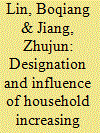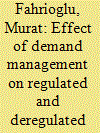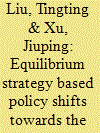| Srl | Item |
| 1 |
ID:
111411


|
|
|
|
|
| Publication |
2012.
|
| Summary/Abstract |
Electricity is the guarantee of normal life, and the electricity price is widely concerned. As a developing country in the transition stage, abundant policy implications are included in the electricity price in China, thus, whether to adjust the resident electricity price is a dilemma for the government. However, the current single tariff system cannot cope with the complex social and environmental problems. A new price mechanism is indeed needed. This paper tries to design an increasing block tariffs system with the consideration of residential income and electricity consumption. The result indicates that the increasing block tariffs system with four-tier structure is more reasonable for China. Although the increasing block tariffs will result in the increase of electricity price, it is still acceptable and affordable. The increasing block tariffs will greatly improve the equity and efficiency, and promote the electricity saving and emissions reduction. Moreover, the power companies will increase tariffs revenue, which would use to the transmission networks investment in poor area. In order to the offset the limitations of the increasing block tariffs, the government should adopt some complementary measures.
|
|
|
|
|
|
|
|
|
|
|
|
|
|
|
|
| 2 |
ID:
186193


|
|
|
|
|
| Summary/Abstract |
We analyze the design of an international climate agreement. In particular, we consider two goals of such an agreement: overcoming free-rider problems and adjusting for differences in mitigation costs between countries. Previous work suggests that it is difficult to achieve both of these goals at once under asymmetric information because countries free ride by exaggerating their abatement costs. We argue that independent information collection (investigations) by an international organization can alleviate this problem. In fact, though the best implementable climate agreement without investigations fails to adjust for individual differences even with significant enforcement power, a mechanism with investigations allows adjustment and can enable implementation of the socially optimal agreement. Furthermore, when the organization has significant enforcement power, the optimal agreement is achievable even with minimal investigative resources (and vice versa). The results suggest that discussions about institutions for climate cooperation should focus on information collection as well as enforcement.
|
|
|
|
|
|
|
|
|
|
|
|
|
|
|
|
| 3 |
ID:
150804


|
|
|
|
|
| Summary/Abstract |
Our society derives a quantifiable benefit from electric power. In particular, forced outages or blackouts have enormous consequences on society, one of which is loss of economic surplus. The society relies on having a continuous supply of electrical energy. Some customers may willingly risk this continuous supply and participate in demand management programs for electrical power. If the power system grid is in trouble, electric utilities need to have demand relief. Customers willing to reduce their demand to help the system can receive an incentive fee for helping the utilities. Demand relief can be system wide or location specific. Sometimes it can be more effective to fix the electrical demand vs. supply imbalance from the demand side. The value of demand management contracts is greatly affected by customer location. Inclusion of locational attributes into the contract design procedure increases the effectiveness of the contracts by helping a utility get more value from its demand management programs. Independent System Operators and regulators, among others, can also benefit from effective demand management. This paper will investigate how this type of demand management contracts can help the electricity sector both in regulated and deregulated environments.
|
|
|
|
|
|
|
|
|
|
|
|
|
|
|
|
| 4 |
ID:
180164


|
|
|
|
|
| Summary/Abstract |
As part of China's power industry reforms, developing appropriate market designs for the inclusion of renewable energy in the electricity spot market has been an ongoing challenge. This paper examined the effects of different market rules on wind power producer behavior to identify the policy implications for a renewable-friendly spot market, for which a market equilibrium model was developed to assess power transactions in the day-ahead and balancing markets, with the upper level being wind power producers seeking the best profits, and the lower level being the market clearing process to minimize generation costs. A case study is given, in which different scenarios are explored to assess the effects of bidding regulations and imbalance pricing mechanisms and to simulate the rising wind penetration in power systems. It was found that in the region modeled: more relaxed bidding regulations could provide wind producers incentives by allowing more profitable strategies; the imbalance pricing settings influence market results and producer revenues; and lower spot prices and power generation costs occur if a larger wind share was fed into the power system and could result in a unit revenue decline. Therefore, new policy directions are needed for the development of China's renewable-friendly electricity markets.
|
|
|
|
|
|
|
|
|
|
|
|
|
|
|
|